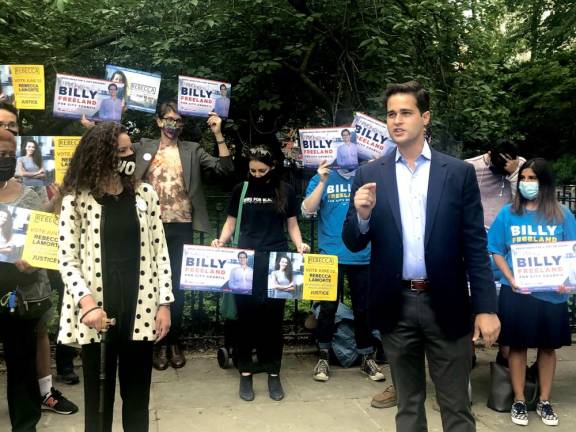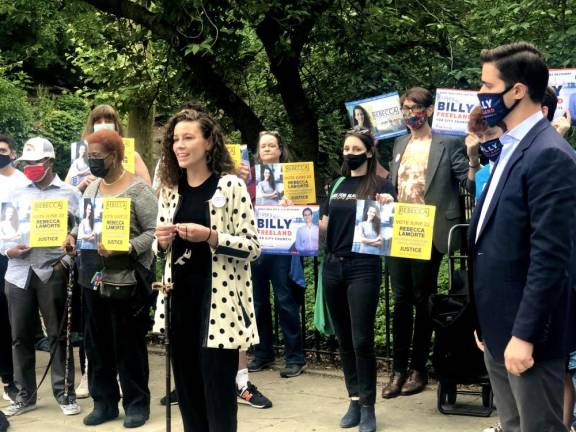Freeland and Lamorte Cross-endorse
Reflecting a new trend, the two District 5 candidates pledge to be each other’s No. 2 to ensure a progressive win


Two candidates running in what’s been an ultra-competitive, seven-person City Council race have endorsed one another as their No. 2 picks to represent District 5 on the Upper East Side, hoping the move will help ensure a progressive is elected to the seat.
Billy Freeland and Rebecca Lamorte are urging their respective supporters to rank the other candidate as No. 2 on their ballots for the primary election, for which early voting begins Saturday, June 12, and will spend the next 11 days campaigning together. This kind of cross-endorsement among candidates has been a new trend that’s a result of the city’s new ranked-choice voting system, which allows New Yorkers to vote for their top five candidates by preference.
The officially announced their endorsement of one another Friday evening at Carl Schurz Park in front of supporters. Afterward, both teams of volunteers canvassed together to let voters know Freeland and Lamorte had joined forces.
Throughout the primary campaign, both Lamorte and Freeland staked claim to the Democratic Party’s left and have been embraced by the same progressive organizations – both earning the endorsements of Our Revolution, New York Progressive Action Network, UES Progressives, the Black Lives Caucus, the Jewish Vote, and, most recently, Rep. Alexandria Ocasio-Cortez’s Courage to Change PAC. It’s their shared values and vision, as well as time working together on Community Board 8, that’s driving their joint effort in the final days of the race.
“We’re in a moment right now where what we really need is strong progressive leadership. In the mayor’s race I see a lot of uncertainty, and it makes the stakes even greater that we have a City Council that’s progressive – and not just progressive, but who really deeply knows our communities,” Freeland told Our Town. “I’m ranking Rebecca second because I’ve seen her progressive leadership. I’ve seen how she’s elevated issues of housing, economic and disability justice in really profound and important ways in our race. I’ve also worked closely with her on the community board and I know her commitment to our community. And I’m convinced that what we need most is someone who has a deep commitment to our community, and a proven commitment to our community, with the right progressive values and ideals to build on the work that Council Member Kallos has done in our district.”
Lamorte echoed Freeland on their shared goals.
“I’ve seen Billy working so hard in the community, from being on the community board to volunteering with Holmes-Isaacs, for example, and providing that service long before COVID and during COVID,” she said. “I know and I trust that after the pandemic, whether or not he’s a council member, he will continue just serving the community as he has, focusing on the progressive values that will house our unhoused neighbors, build completely affordable housing, take the power from real estate, and advance widespread accessibility.”
Unorthodox Move
Lamorte and Freeland are not the first pair of candidates to cross-endorse one another in the new era brought on by ranked-choice voting. Earlier this month District 6 candidates Jeffrey Omura and Sara Lind urged their supporters to rank the other No. 2 on their ballots, hoping to better than chances against Manhattan Borough President and candidate Gale Brewer, who is the favorite to win back her old seat. In an even more unorthodox move, five candidates in District 7 – Marti Allen-Cummings, Dan Cohen, Stacy Lynch, Maria Ordoñez and Corey Ortega – created a coalition of sorts, asking voters to rank them Nos. 1 through 5 on their ballots, notably leaving out Shaun Abreu, who is a frontrunner and the current CD7 member Mark Levine’s choice candidate to replace him.
This new trend could become the norm in future election cycles, and if successful, could help insurgent candidates take on so-called “machine” candidates.
While their decision to cross-endorse one another did involve some strategy, Lamorte said ranked-choice voting provides a “positive moment” for the community in which people can truly vote their values.
“The truth is for the first time, we don’t have to be worried about the progressive choices cannibalizing each other, and people wondering, ‘how do I decide between the two?” Freeland added. “That’s one of the beautiful things about this new system.”
For more election coverage, sign up for The Trail, our weekly newsletter covering Manhattan politics: www.bit.ly/thetrailnyc